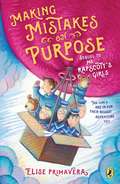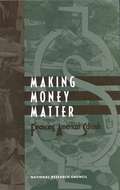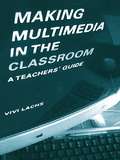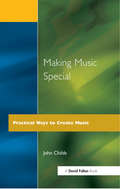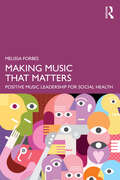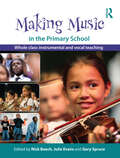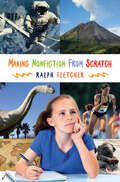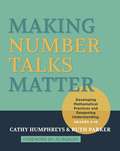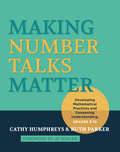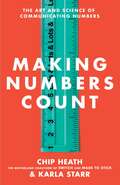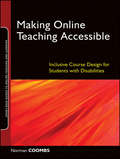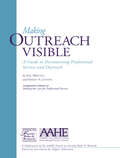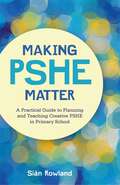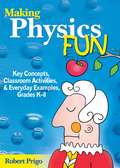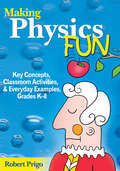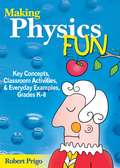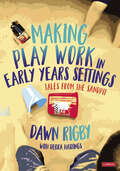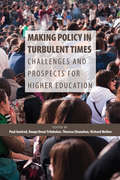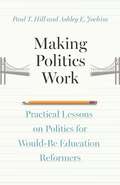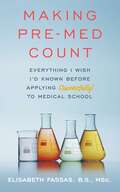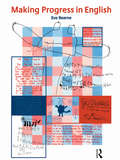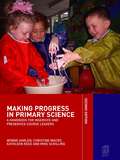- Table View
- List View
Making Mistakes on Purpose
by Elise PrimaveraStudents at a whimsical school for children of busy parents learn silly lessons about manners, friendship, and going far in life, in book two of the series that's tailor-made for a new generation of Mary Poppins fans Great Rapscott School for Girls of Busy Parents is not your typical boarding school. Students arrive in boxes, birthday cake is served for breakfast, and two very talented corgis assist the rather quirky headmistress. This semester, the girls will learn how to get to The Top, but the semester is not off to a good start. One of the girls doesn't make it back to school and when her friends try to rescue her, they wind up at the Bottom of the Barrel. Luckily, Ms. Rapscott knows that learning to fail is the secret to Going Far in life. Complete with charming black-and-white illustrations, this sequel to Ms. Rapscott's Girls is full of, warmhearted lessons, spirited adventure, and good cheer.From the Hardcover edition.
Making Money Matter: Financing America's Schools
by National Research CouncilThe United States annually spends over $300 billion on public elementary and secondary education. As the nation enters the 21st century, it faces a major challenge: how best to tie this financial investment to the goal of high levels of achievement for all students. In addition, policymakers want assurance that education dollars are being raised and used in the most efficient and effective possible ways. The book covers such topics as: Legal and legislative efforts to reduce spending and achievement gaps.The shift from "equity" to "adequacy" as a new standard for determining fairness in education spending.The debate and the evidence over the productivity of American schools.Strategies for using school finance in support of broader reforms aimed at raising student achievement. This book contains a comprehensive review of the theory and practice of financing public schools by federal, state, and local governments in the United States. It distills the best available knowledge about the fairness and productivity of expenditures on education and assesses options for changing the finance system.
Making Multimedia in the Classroom: A Teachers' Guide
by Vivi LachsMultimedia authoring offers a motivating and imaginative approach to subject matter where students can develop skills in group work and problem solving. This teachers guide explores the process of students authoring multimedia presentations on computer using images, text, sound, animation and video, as an integrated part of their curriculum work. It offers a theoretical basis, detailed practical advice and many classroom examples. Each chapter covers a different aspect of multimedia authoring including: * planning multimedia into the curriculum* case studies and examples of student multimedia presentations* classroom management of the project* assessment and evaluation* choosing software and resources. This book encourages teachers to be imaginative about their subject and gives an important strategy for student motivation. It comes with a CD-ROM which can be used in the classroom as an introduction to multimedia work. Essential reading for all primary and secondary teachers.
Making Music Special: Practical Ways to Create Music
by John ChildsThis work provides practical ideas for early music making and more sophisticated ideas for creative improvisation. Specific sections of music are explored. The first of these is that of the basic ingredients of music, such as rhythm, pitch and timbre. The second section to be explored is music for those who experience learning difficulties. Also considered is the question of how to build musical relationships. The text looks additionally at the development of musical choice and creativity.
Making Music That Matters: Positive Music Leadership for Social Health
by Melissa ForbesThis book presents a transformative vision for musicians seeking meaningful careers while revitalising community wellbeing. In an era of unprecedented social disconnection, this groundbreaking book weaves together positive and social psychology, leadership studies, and interpersonal neurobiology to illuminate powerful pathways for musicians to engage in rewarding work with profound social impact.Through evidence-based frameworks and compelling case studies, this book provides practical strategies for musicians to harness their strengths, foster belonging within diverse groups, and articulate their work's value as a public health resource. Organised in three parts—focused on leading leading self, leading others, and understanding context—the chapters include frameworks for identifying strengths, creating energising relationships, building group identities, and developing systems thinking, alongside reflective exercises and real-world applications. Readers will discover how to create transformative musical experiences that build personal fulfilment and strengthen community connections.This accessible book speaks to musicians seeking to diversify their career portfolios, educators developing future music leaders, and health professionals interested in harnessing music's connective power through innovative social programs. It reveals how approaching musicianship as positive leadership creates dual impact—enriching both musicians' careers and the social health of the communities they serve.
Making Music in the Primary School: Whole Class Instrumental and Vocal Teaching
by Nick Beach Julie Evans Gary SpruceMaking Music in the Primary School is an essential guide for all student and practising primary school teachers, instrumental teachers and community musicians involved in music with children. It explores teaching and learning music with the whole class and provides a framework for successful musical experiences with large groups of children. Striking the perfect balance between theory and practice, this invaluable text includes case studies and exemplars, carefully designed activities to try out in the classroom, as well as a range of tried-and-tested teaching strategies to help you support and develop children’s musical experience in the classroom. Grounded within a practical, philosophical and theoretical framework, the book is structured around the four key principles that underpin effective music teaching and experience: Integration – how can we join up children’s musical experiences? Creativity – how can we support children’s musical exploration? Access and Inclusion – how can we provide a relevant experience for every child? Collaboration – how might we work together to achieve these aims? Written in a clear, accessible and engaging style, Making Music in the Primary School will give you all the confidence you need when working with whole classes, whatever your musical or teaching background.
Making Nonfiction from Scratch
by Ralph FletcherDo you have students whose nonfiction writing is formulaic, devoid of energy and voice? In Making Nonfiction from Scratch bestselling PD and children's book author Ralph Fletcher offers a candid critique of how nonfiction writing is often taught in schools and gives teachers the inspiration and strategies they need to help their students write authentic nonfiction. Skilled nonfiction writers draw on strategies, techniques, and craft found in other genres: poetry, comedy, even mystery. Without those elements, nonfiction would be dry and dull. Making Nonfiction from Scratch helps bring all of those aspects together and shows how each genre can enrich nonfiction writing. Ralph emphasizes the power of choice, mentor texts, and nonfiction read-alouds in making nonfiction an everyday part of classrooms. Classroom Connection- sections throughout the book suggest immediate, practical strategies for putting the ideas in the book to use. Two case studies and a chapter on the dos and don'ts of nonfiction writing instruction round out this short, practical book. Any informational writing should be insightful, accurate, and well organized - but it doesn't have to be boring. Ralph invites you to make your classroom a place where students can create delicious nonfiction full of passion, voice, and insight.
Making Number Talks Matter: Developing Mathematical Practices And Deepening Understanding, Grades 4-10
by Cathy Humphreys Ruth ParkerMaking Number Talks Matter is about the myriad decisions facing teachers as they make this fifteen-minute daily routine a vibrant and vital part of their mathematics instruction. Throughout the book, Cathy Humphreys and Ruth Parker offer practical ideas for using Number Talks to help students learn to reason numerically and build a solid foundation for the study of mathematics. This book will be an invaluable resource whether you are already using Number Talks or not; whether you are an elementary, middle school, high school, or college teacher; or even if you are a parent wanting to support your child with mathematics. Using insight gained from many years of doing Number Talks with students of all ages, Cathy and Ruth address questions to ask during Number Talks, teacher moves that turn the thinking over to students, the mathematics behind the various strategies, and ways to overcome bumps in the road. If you've been looking for ways to transform your mathematics classroom--to bring sense-making and divergent thinking to the foreground, to bring the Standards for Mathematical Practice to life, and to bring joy back into your instruction--this book is for you.
Making Number Talks Matter: Developing Mathematical Practices and Deepening Understanding, Grades 3-10
by Cathy Humphreys Ruth ParkerMaking the transition to student-centered learning begins with finding ways to get students to share their thinking, something that can be particularly challenging for math class. Authors Ruth Parker and Cathy Humphreys introduce. Making Number Talks Matter: Developing Mathematical Practices and Deepening Understanding, Grades 3-10, taking the readers into classrooms where their Number Talks routines are taught. Parker and Humphreys apply their 15 minute lessons to inspire and initiate math talks. Through vignettes in the book, you'll meet other teachers learning how to listen closely to students and how to prompt them into figuring out solutions to problems. You will learn how to make on-the-spot decisions, continually advancing and deepening the conversation. Making Number Talks Matter includes: Sample Problems: Filled with a range of Number Talks problems, 10-15 minute warm-up routines that lend themselves to mental math and comparison of strategies Navigating Rough Spots: Learn how to create a safe environment fortrickyor challenging student discussions that can arise when talking through problems and sharing ideas Responding to Mistakes: Ways to handle misconceptions and mathematical errors that come up during the course of Number Talk conversations Making Number Talks Matter is filled with teaching tips for honoring student contributions while still correcting errors, and teaching concepts while nudging independent thinking. Whether you are an elementary, middle school, or high school teacher, through daily practice and open conversation, you can build a solid foundation for the study of mathematics and Make Number Talks Matter.
Making Numbers Count: The Art and Science of Communicating Numbers
by Chip Heath Karla StarrA clear, practical, first-of-its-kind guide to communicating and understanding numbers and data—from bestselling business author Chip Heath.How much bigger is a billion than a million? Well, a million seconds is twelve days. A billion seconds is…thirty-two years. Understanding numbers is essential—but humans aren&’t built to understand them. Until very recently, most languages had no words for numbers greater than five—anything from six to infinity was known as &“lots.&” While the numbers in our world have gotten increasingly complex, our brains are stuck in the past. How can we translate millions and billions and milliseconds and nanometers into things we can comprehend and use? Author Chip Heath has excelled at teaching others about making ideas stick and here, in Making Numbers Count, he outlines specific principles that reveal how to translate a number into our brain&’s language. This book is filled with examples of extreme number makeovers, vivid before-and-after examples that take a dry number and present it in a way that people click in and say &“Wow, now I get it!&” You will learn principles such as: -SIMPLE PERSPECTIVE CUES: researchers at Microsoft found that adding one simple comparison sentence doubled how accurately users estimated statistics like population and area of countries. -VIVIDNESS: get perspective on the size of a nucleus by imagining a bee in a cathedral, or a pea in a racetrack, which are easier to envision than &“1/100,000th of the size of an atom.&” -CONVERT TO A PROCESS: capitalize on our intuitive sense of time (5 gigabytes of music storage turns into &“2 months of commutes, without repeating a song&”). -EMOTIONAL MEASURING STICKS: frame the number in a way that people already care about (&“that medical protocol would save twice as many women as curing breast cancer&”). Whether you&’re interested in global problems like climate change, running a tech firm or a farm, or just explaining how many Cokes you&’d have to drink if you burned calories like a hummingbird, this book will help math-lovers and math-haters alike translate the numbers that animate our world—allowing us to bring more data, more naturally, into decisions in our schools, our workplaces, and our society.
Making Online Teaching Accessible
by Norman CoombsAs educational institutions rapidly expand into online and hybrid formats, designing with accessibility in mind becomes essential. This book helps online teachers, instructional designers, and content developers avoid inadvertently creating barriers for students with disabilities and comply with government-mandated ADA standards. Grounded in the theories of learner-centered teaching and successful course design, the book explains how to design course content and delivery to be both attractive and accessible to all students, creating better conditions for student learning, success, and satisfaction, and better preparing students to compete in the competitive workplace.
Making Online Teaching Accessible: Inclusive Course Design for Students with Disabilities
by Norman CoombsMaking Online Teaching Accessible offers online teachers, instructional designers, and content developers a comprehensive resource for designing online courses and delivering course content that is accessible for all students including those with visual and audio disabilities. Grounded in the theories of learner-centered teaching and successful course design, Making Online Teaching Accessible outlines the key legislation, decisions, and guidelines that govern online learning. The book also demystifies assistive technologies and includes step-by-step guidance for creating accessible online content using popular programs like Microsoft Office and Adobe Acrobat, as well as multimedia tools. Including a wealth of helpful tips and suggestions for effectively communicating with disabled students, the book contains practical advice on purchasing accessible course management systems, developing solutions for inaccessibility issues, and creating training materials for faculty and staff to make online learning truly accessible.
Making Outreach Visible: A Guide to Documenting Professional Service and Outreach
by Amy Driscoll Ernest A. LyntonFaculty professional service/outreach won’t get the respect and reward accorded other forms of scholarship until it can be documented and subjected to peer review. This companion volume to Lynton’s Making the Case for Professional Service delivers specifics for developing such a review process. The protocol calls for teams of faculty and administrators to reach consensus on goals, definitions, and logistics through guided reflection and discussion of prototype portfolios. Sixteen prototypes are included in the volume, the product of a three-year Kellogg-funded project.
Making PSHE Matter: A Practical Guide to Planning and Teaching Creative PSHE in Primary School
by Siân RowlandOffering ideas for different ways to teach PSHE, this is a go-to resource for the busy teacher looking for creative and engaging techniques. It provides tips, case studies and strategies on planning and pitching sessions as well as weaving PSHE into other aspects of the curriculum. The practical advice includes tips for what works with pupils, ideas for group games, ways to make discussions more engaging and proven techniques for creating inspiring sessions. The book explores a range of complex PSHE topics such as social media, sex and sexuality, mental health and British values. This tried-and-tested guidance will help to give teachers the confidence to create accessible and dynamic skills-based sessions which can make a real difference to pupils.
Making Physics Fun
by Robert PrigoBoost student interest and understanding in the physical sciences!Teaching physical science in the elementary and middle grades can be challenging for busy teachers faced with growing demands and limited resources. Robert Prigo provides fun and engaging activities using safe, available materials that educators can easily incorporate into lesson plans. Extensive examples, sample inquiry questions, and ideas for initiating units are readily available for teachers to pick and choose from to meet student needs.The result of more than two decades of professional development work with hundreds of teachers and administrators, this resource addresses specific areas of physical science, including motion and force, waves and sound, light and electromagnetic waves, and more. Dozens of activities demonstrating physics in action help students of all ages relate physics principles to their everyday experiences.This practitioner-friendly resource helps teachers: Address the "big ideas" in K-8 science education Promote student understanding with ready-to-use learning experiences Use hands-on activities to help students make larger, real-world connections Assemble classroom learning centers to facilitate deeper understanding of basic physics principlesWith conceptual summaries to support teachers' proficiency and understanding of the content, this guidebook is ideal for bringing physics to life for students in the classroom and in their lives!
Making Physics Fun: Key Concepts, Classroom Activities, and Everyday Examples, Grades K-8
by Robert PrigoIn easy-to-understand language, this resource presents engaging, ready-to-use learning experiences that address the "big ideas" in K–8 science education and help students make larger, real-world connections.
Making Physics Fun: Key Concepts, Classroom Activities, and Everyday Examples, Grades K?8
by Robert PrigoBoost student interest and understanding in the physical sciences!Teaching physical science in the elementary and middle grades can be challenging for busy teachers faced with growing demands and limited resources. Robert Prigo provides fun and engaging activities using safe, available materials that educators can easily incorporate into lesson plans. Extensive examples, sample inquiry questions, and ideas for initiating units are readily available for teachers to pick and choose from to meet student needs.The result of more than two decades of professional development work with hundreds of teachers and administrators, this resource addresses specific areas of physical science, including motion and force, waves and sound, light and electromagnetic waves, and more. Dozens of activities demonstrating physics in action help students of all ages relate physics principles to their everyday experiences.This practitioner-friendly resource helps teachers: Address the "big ideas" in K-8 science education Promote student understanding with ready-to-use learning experiences Use hands-on activities to help students make larger, real-world connections Assemble classroom learning centers to facilitate deeper understanding of basic physics principlesWith conceptual summaries to support teachers' proficiency and understanding of the content, this guidebook is ideal for bringing physics to life for students in the classroom and in their lives!
Making Play Work in Early Years Settings: Tales from the sandpit
by Dawn RigbyMaking a play-based curriculum work in early years settings. Early Years practitioners have been advocating for play to be at the heart of early years for many years. Now is the time to make this a reality. Using in the moment planning, child initiated play and other strategies, this book supports early years practitioners to enable the children in their setting to choose what they do and how they want to learn. Dawn Rigby shares her passion for a play-based curriculum, her own setting′s journey, what worked and the challenges faced along the way. This practical book: shares examples of good practice; gives advice on how to make play the central focus of early years practice; explores why a play-based curriculum matters; includes practical support on developmentally appropriate practice.
Making Play Work in Early Years Settings: Tales from the sandpit
by Dawn RigbyMaking a play-based curriculum work in early years settings. Early Years practitioners have been advocating for play to be at the heart of early years for many years. Now is the time to make this a reality. Using in the moment planning, child initiated play and other strategies, this book supports early years practitioners to enable the children in their setting to choose what they do and how they want to learn. Dawn Rigby shares her passion for a play-based curriculum, her own setting′s journey, what worked and the challenges faced along the way. This practical book: shares examples of good practice; gives advice on how to make play the central focus of early years practice; explores why a play-based curriculum matters; includes practical support on developmentally appropriate practice.
Making Policy Public
by Susan L. MoffittThis book challenges the conventional wisdom that government bureaucrats inevitably seek secrecy and demonstrates how and when participatory bureaucracy manages the enduring tension between bureaucratic administration and democratic accountability. Looking closely at federal level public participation in pharmaceutical regulation and educational assessments within the context of the vast system of American federal advisory committees, this book demonstrates that participatory bureaucracy supports bureaucratic administration in ways consistent with democratic accountability when it focuses on complex tasks and engages diverse expertise. In these conditions, public participation can help produce better policy outcomes, such as safer prescription drugs. Instead of bureaucracy's opposite or alternative, public participation can work as its complement.
Making Policy in Turbulent Times: Challenges and Prospects for Higher Education (Queen's Policy Studies Series #306)
by Paul Axelrod Roopa Desai Trilokekar Richard Wellen Theresa ShanahanHow is policy made in higher education, particularly in the wake of recent economic turbulence? Has policy development converged internationally, and if so, what impact has this had on academic life and institutions? What role does policy-oriented research play in shaping the direction of higher education? Are universities grappling in common ways with issues of access and equity? Making Policy in Turbulent Times provides a historically informed and nuanced response to these and other questions. Distinguished scholars and administrators from across the globe identify economic challenges and pressures facing universities, compare policy developments in numerous jurisdictions, and demonstrate the ways in which networks and lobbyists achieve results. Cogently argued, Making Policy in Turbulent Times contributes significantly to new research, and will be of great interest to scholars and practitioners alike.
Making Politics Work: Practical Lessons on Politics for Would-Be Education Reformers
by Paul T. Hill Ashley E. JochimAn expansive study shows how politics can work for, not just against, efforts to improve America’s schools. The education reform project has always been about making America’s schools more effective for the children who attend them. In Making Politics Work, authors Paul T. Hill and Ashley E. Jochim show that this project cannot succeed without mastering what is the single largest constraint on its success: politics. Drawing upon more than a decade of work with dozens of school systems, Hill and Jochim show how failures to secure political support or mitigate inevitable opposition dooms the education reform project from the start. But this outcome is not inevitable. By tracing the evolution of the “portfolio strategy” across 27 localities that implemented it, they uncover practical lessons that superintendents, state leaders, and foundation officials can use to increase the likelihood that their ideas for improving public education don’t join the list of once-promising initiatives that could not be sustained in the face of intractable political conflict.
Making Pre-Med Count: Everything I wish I'd known before applying (successfully!) to med school
by Elisabeth FassasIn Making Pre-Med Count, med student Elisabeth Fassas shares personal stories from her own experiences to help guide you through the pre-med process. You’ll get first-hand guidance and learn how to apply her advice to your own med school journey.Counselors and checklists are helpful, but your pre-med journey cannot be boiled down to a list of activities and a collection of accolades. In Making Pre-Med Count, Fassas teaches you how to translate your accomplishments into a compelling and personalized med school application. Fassas gets into the weeds of the pre-med years to touch on the most fundamental and gnawing questions that interested applicants must face. Using examples from her own journey from freshman year to acceptance, plus tips and tricks from her peers, she guides readers through an endless stream of conflicting advice towards preparing academically, mentally and psychologically for the med school application process.Her advice starts with the idea that anything and everything can get you into medical school if you’re able to get into the heads of the admissions committee. You’ll also get her take on many of the questions raised in student forums. Fassas, who will begin med school in the fall of 2019, helps relieve some of the common pre-med doubts, anxieties, and fears that you’ll feel. Making Pre-Med Count compiles Fassas’ advice in one place -- it’s like having your own personal med school advisor.
Making Progress in English
by Eve BearneThis manual is designed to help teachers establish a principled framework for developing English at Key Stages 1 and 2. Covering all aspects of English, it will help teachers raise standards of achievement in pupils at all levels of fluency and confidence.The author uses case study material to relate theory to practice, covering issues such as classroom organization and management. She also provides guidance for planning and developing ideas with colleagues and with children, and offers suggestions for teaching strategies with photocopiable sheets and formats and ways to evaluate teaching.Separate sections deal with reading, writing, speaking and listening, and these different threads are drawn together in sections on knowledge about language - including spelling, grammar and punctuation - and study of texts - including media, poetry, drama, response to literature and the use of non-fiction texts. The final section deals with policy and schemes of work. Each chapter also offers information on: * assessment, recording and reporting, linked to scales of progression* frameworks for screening and supporting children who have difficulties with English* gender* working with parents* linguistic and cultural diversityEve Bearne teaches at Homerton College, Cambridge.
Making Progress in Primary Science: A Study Book for Teachers and Student Teachers
by Wynne Harlen Christine Macro Kathleen Reed Mike SchillingThis new and extensively revised edition of Progress in Primary Science is intended for all those involved in training teachers of primary school science, both preservice and on INSET courses. Its flexible modular structure enables course leaders to tailor their course to participants' needs. Each module can be studied individually or as part of an extended programme and contains notes for facilitators, photocopiable workshop materials, activities for practitioners and suggestions for further reading. Throughout the book the focus is on the learning of science as an investigative process through which pupils develop an understanding of ideas. This is supported by modules on different aspects of teaching and learning in science, including: building on children's own ideas how to ask and answer questions managing practical work in the classroom science for very young children effective assessment, self-assessment and feedback cross-curricular links ICT and science science outside the classroom. The companion study book currently available can be used by those participating on these courses. It follows the same modular structure and contains the same information as this book, and makes planning and delivering the course easier and less time consuming for the course leader.
